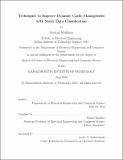Techniques to improve dynamic cache management with static data classification
Author(s)
Mukkara, Anurag
DownloadFull printable version (872.3Kb)
Other Contributors
Massachusetts Institute of Technology. Department of Electrical Engineering and Computer Science.
Advisor
Daniel Sanchez.
Terms of use
Metadata
Show full item recordAbstract
Cache hierarchies are increasingly non-uniform and difficult to manage. Several techniques, such as scratchpads or reuse hints, use static information about how programs access data to manage the memory hierarchy. Static techniques are effective on regular programs, but because they set fixed policies, they are vulnerable to changes in program behavior or available cache space. Instead, most systems rely on dynamic caching policies that adapt to observed program behavior. Unfortunately, dynamic policies spend significant resources trying to learn how programs use memory, and yet they often perform worse than a static policy. This thesis presents Whirlpool, a novel approach that combines static information with dynamic policies to reap the benefits of each. Whirlpool statically classifies data into pools based on how the program uses memory. Whirlpool then uses dynamic policies to tune the cache to each pool. Hence, rather than setting policies statically, Whirlpool uses static analysis to guide dynamic policies. Whirlpool provides both an API that lets programmers specify pools manually and a profiling tool that discovers pools automatically in unmodified binaries. On a state-of-the-art NUCA cache, Whirlpool significantly outperforms prior approaches: on sequential programs, Whirlpool improves performance by up to 38% and reduces data movement energy by up to 53%; on parallel programs, Whirlpool improves performance by up to 67% and reduces data movement energy by up to 2.6x.
Description
Thesis: S.M., Massachusetts Institute of Technology, Department of Electrical Engineering and Computer Science, 2016. This electronic version was submitted by the student author. The certified thesis is available in the Institute Archives and Special Collections. Cataloged from student-submitted PDF version of thesis. Includes bibliographical references (pages 55-59).
Date issued
2016Department
Massachusetts Institute of Technology. Department of Electrical Engineering and Computer SciencePublisher
Massachusetts Institute of Technology
Keywords
Electrical Engineering and Computer Science.